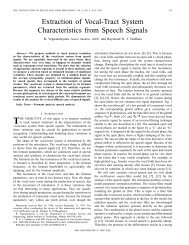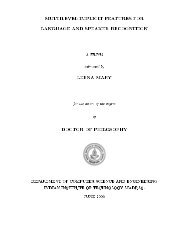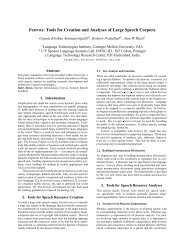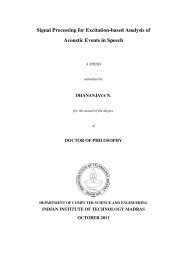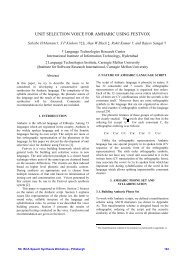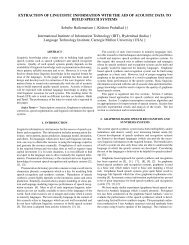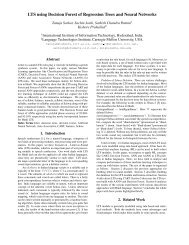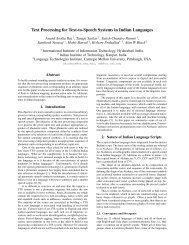word boundary- hypothesisation in hindi speech - Speech and ...
word boundary- hypothesisation in hindi speech - Speech and ...
word boundary- hypothesisation in hindi speech - Speech and ...
You also want an ePaper? Increase the reach of your titles
YUMPU automatically turns print PDFs into web optimized ePapers that Google loves.
2.3.3, uses both prosodic <strong>and</strong> language features <strong>and</strong> it was placed under the studies on<br />
prosodic clues beiause it primarily uses prosodic features.<br />
2.2 Role of <strong>word</strong> boundaries <strong>in</strong> improv<strong>in</strong>g lexical analysis<br />
The ma<strong>in</strong> aim <strong>in</strong> these studies is to explore the improvement <strong>in</strong> the<br />
performance of a lexical analyser <strong>and</strong> thereby establish the need for <strong>word</strong> <strong>boundary</strong><br />
<strong>hypothesisation</strong>. This can be divided <strong>in</strong>to two separate studies, (i) a study <strong>in</strong> which the<br />
performance of the lexical analyser on an <strong>in</strong>put without <strong>word</strong> boundaries is estimated,<br />
<strong>and</strong> (ii) a study <strong>in</strong> which the performance of the lexical analyser on an <strong>in</strong>put with <strong>word</strong><br />
boundaries is estimated. The results are compared with those of (i) to establish the<br />
necessity of <strong>word</strong> <strong>boundary</strong> <strong>hypothesisation</strong>.<br />
Two studies were reported <strong>in</strong> literature on the effect of <strong>word</strong> <strong>boundary</strong><br />
ambiguity on lexical analysis. However, these studies, as mentioned later, have<br />
addressed the issues only partially. The first study was conducted at the Centre for<br />
<strong>Speech</strong> Technology Research(CSTR), Ed<strong>in</strong>burgh [Harr<strong>in</strong>gton <strong>and</strong> Johnstone 19871. In<br />
this study, the performance of a lexical analyser <strong>in</strong> the absence of any <strong>word</strong> boundaries<br />
<strong>in</strong> its <strong>in</strong>put was studied. The performance of the lexical analyser was measured <strong>in</strong> terms<br />
of the number of alternate <strong>word</strong> str<strong>in</strong>gs match<strong>in</strong>g the <strong>in</strong>put sentence. The <strong>in</strong>put to the<br />
lexical analyser was represented <strong>in</strong> two representations, phonen~e <strong>and</strong> midclass [Dalby,<br />
Laver <strong>and</strong> Hiller 1986; Harr<strong>in</strong>gton <strong>and</strong> Johnstone 19871, <strong>and</strong> the number of alternate<br />
<strong>word</strong> str<strong>in</strong>gs match<strong>in</strong>g a sentence (without any <strong>word</strong> boundaries) was estimated for<br />
both the representations. A dictionary conta<strong>in</strong><strong>in</strong>g the 4000 most frequent English<br />
<strong>word</strong>s was used. The dictionary was represented <strong>in</strong>ternally as a tree-structured<br />
dictionary <strong>and</strong> a left to right match<strong>in</strong>g strategy similar to the one described <strong>in</strong> [Cole<br />
<strong>and</strong> Jakimik 19801 was used. A total of 50 sentences were used <strong>in</strong> the match<strong>in</strong>g. The<br />
results of the study are <strong>in</strong> the follow<strong>in</strong>g:



